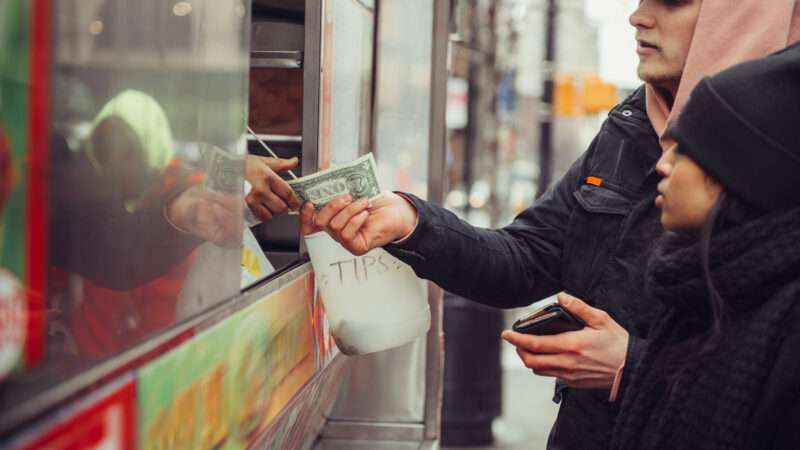
A new report suggests New York City’s shift away from police enforcement of street-food vending, which was supposed to protect vendors from the constant regulatory harassment they face in the city, has failed to achieve its key goals. In fact, according to new data released this week by Gothamist and WNYC, the city may be ticketing vendors more now than before the change.
When the move away from police enforcement of vending regulations was first proposed under then-Mayor Bill de Blasio in 2020, I called it an overdue and welcome move that should deescalate dangerous and needless confrontations between police and food vendors.
Last year, the city shifted primary enforcement of vending regulations from NYPD to the Department of Consumer and Worker Protection (DCWP). But the new WNYC/Gothamist data reveal city police are still issuing tickets. That—coupled with the fact DCWP issued more tickets this past summer than the city did during the same period in 2019—means that, combined, Eater New York reports, DCWP and NYPD “issued 540 tickets from July to September last year, as compared to 525 tickets issued by the NYPD in the same period in 2019.”
The quality and quantity of the tickets can be infuriating. One vendor Gothamist spoke with claims to have received 70 tickets last year, some for alleged violations (such as “not standing close enough to the curb”) that can carry fines of up to $1,000.
Problems with New York City’s regulations for food vendors go far beyond which agency issues pricey tickets to alleged violators. In fact, blame for the overwhelming majority of any “problem” with food vending in New York City falls squarely on the city’s longstanding and utterly pointless cap on vending permits—which every food-vending operation must have in order to sell legally in the city. The city’s cap on permits has stood at around 3,000 for decades, I explained in a 2011 article for Reason. As I detailed, permits attach to things—food trucks, stands, carts, and the like. Licenses, on the other hand, which are also required but are not capped, must be held by the people who work on those food trucks, carts, or stands.
Practically, the cap on permits means thousands of New Yorkers who want to sell street food legally—including those with valid licenses—cannot do so for no reason other than that the city refuses to sell them the permits it requires.
That artificially low cap on permits forces thousands of interested city vendors either to operate without a permit, which is illegal, or to buy a permit on the black market, which is also illegal.
That was 11 years ago. The problem still exists. And now New York City is back to ticketing vendors aggressively.
That’s problematic for many reasons. For one, food vendors can be particularly vulnerable. For decades, for example, recent immigrants—no one’s idea of a powerful lobby—have comprised a significant number of city food vendors. And since the Covid pandemic, chefs and other kitchen staff who’ve lost jobs have also swelled the ranks of vendors. And while New York City’s permit process doesn’t serve to protect consumers and workers—the DCWP’s whole raison d’etre—it does serve to protect incumbent vendors and brick-and-mortar businesses from competition. Protectionism is no basis for law.
While terrible, New York City’s egregious permitting process may not be the nation’s worst. Across the country, in Los Angeles, underground food vendors who were promised a path to legal vending are experiencing largely what New York’s vendors face—and on an even larger scale. As I explained in a December column, a California state law passed in 2018 that “was supposed to decriminalize and legalize street vending for the estimated 10,000 underground food vendors” in Los Angeles County (along with others across the state) has failed egregiously. In L.A. County, 98 percent of those 10,000 or so underground vendors have not been able to obtain vending permits.
Back in New York City, many politicians understand that a problem exists. But their will to treat then-Mayor de Blasio’s slightly gentler enforcement of food vending rules as a first step to reforming a broken process appears not to exist. Last year, for example, tone-deaf mayoral candidate Andrew Yang complained “that NYC is not enforcing rules against unlicensed street vendors.”
For decades, New York City has shown it’s incapable of providing food vendors with a fair and just permitting process. Food vendors are not the problem here. Even modest reform efforts have failed. It’s time for New York City to eliminate its permit requirements for all food vendors.
The post It's Time for New York City To Scrap Its Cap on Street-Food Permits appeared first on Reason.com.
from Latest – Reason.com https://bit.ly/3AJnfWf
via IFTTT